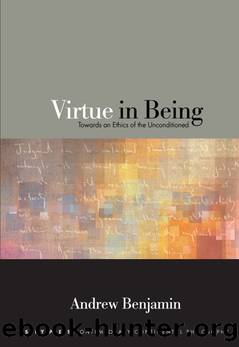Virtue in Being by Benjamin Andrew;

Author:Benjamin, Andrew;
Language: eng
Format: epub
Publisher: State University of New York Press
Published: 2016-08-14T16:00:00+00:00
3.
In order to develop the way in which potentiality has emerged as an element that is integral to the conception of subjectivity within the Kantian project, and thus to the way it is interconnected to the presence of both forms of the unconditioned and the temporality of at-the-same-timeness, the next element in staging this attempt to work through Kant, and thus in thinking through the possibility of recovering virtue in being, involves what can most directly be described as a commentary on defining elements of Part One of Kant’s Religion within the Bounds of Mere Reason.18 This celebrated discussion of “radical evil,” where the latter means no more than the “indwelling” (“der Einwohnung”) of “the evil principle ‘alongside’ [‘neben’] the good,” such that the questions of what ‘‘indwelling” (“der Einwohnung”) and “alongside” (“neben”) means have to be taken as central, allows for the development of an account of the implicit anthropology at work in Kant’s overall argumentation.19 Part of developing that account is the identification of the way a language and a thinking of the dynamic is indispensible to that development. Allusion has already been made to the latter via the invocation of the necessary inscription of modalities of striving within the Kantian project where striving defines a conception of finitude, namely, the conditioned in its relation to the unconditioned, that is itself positioned by the presence of a spacing that pertain anoriginally, and which is held in place and occasioned by at-the-same-timeness. Within the setting created by this set of related and interdependent elements, what has to be noted is the effective presence of the unconditioned and thus the infinite. The latter, as will be suggested, becomes a formulation of the inescapability of the plural event. Again, if there is a summary position, it is that finitude is always an aftereffect of the recognition of the infinite nature of the infinite. Finitude is disclosed by the latter. Moreover, it is a disclosure given within and as consciousness, which is itself the oscillation between the immediacy of recognition and that which occurs as the result of reflection. Reflection is that in which the positing of mere doctrine is displaced and consequently critique occasioned.
The problem of evil, the presence of evil, and thus its already present status, when taken together means that there needs to be an account of evil, which even though the actuality of evil is assumed, nonetheless accounts for evil in terms of its possibility. In other words, a beginning cannot be made with the presence of evil acts or even the presence of the continuity of movement between good and evil acts as though they were simply given. The account of evil (and therefore equally of the good) would have to be given in relation to that which is “original” in both instances. In more general terms what this means, of course, is a recasting of the ethical in relation to possibility and thus the larger question of potentiality. The direct result is a consequent sidelining of the language of obligations, and so on.
Download
This site does not store any files on its server. We only index and link to content provided by other sites. Please contact the content providers to delete copyright contents if any and email us, we'll remove relevant links or contents immediately.
Under the Banner of Heaven: A Story of Violent Faith by Jon Krakauer(1414)
The Early Centuries - Byzantium 01 by John Julius Norwich(1359)
Taken by J. C. Owens(1278)
In Spirit and Truth (In Spiritu Et Veritate Series) by Reed Zoe(1263)
The Amish by Steven M. Nolt(1254)
Play It as It Lays by Joan Didion(1209)
The Apogee - Byzantium 02 by John Julius Norwich(1161)
The Last Man in Russia by Oliver Bullough(1100)
A History of the Amish by Steven M. Nolt(980)
Tears of the Silenced: A True Crime and an American Tragedy; Severe Child Abuse and Leaving the Amish by Misty Griffin(961)
Leaving the Witness by Amber Scorah(948)
Fallen by unknow(927)
David Sedaris Diaries by David Sedaris(917)
The Angel of Forest Hill by Cindy Woodsmall(898)
The Best of Amish Cooking by Phyllis Pellman Good(882)
The Ariana Trilogy by Rachel Ann Nunes(879)
Escape by Carolyn Jessop & Laura Palmer(875)
Deep Blue by unknow(869)
Primal: A Quest for the Lost Soul of Christianity by Mark Batterson(854)
